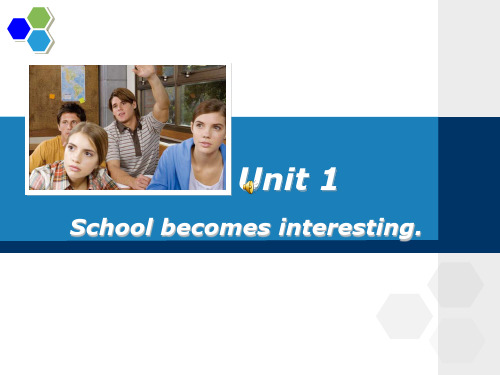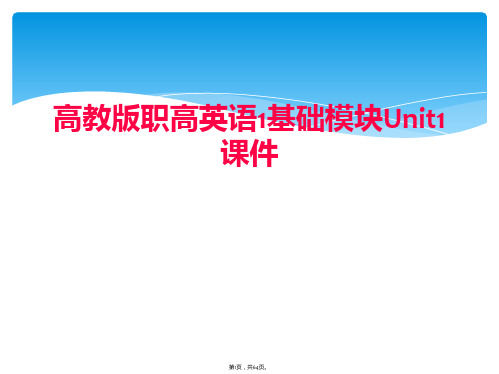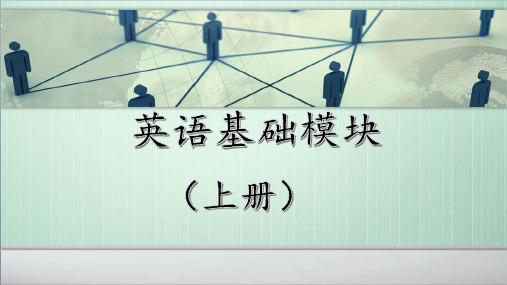英语基础模块1-unit10PPT课件
合集下载
中职英语基础模块unit 1PPT课件

5 Little Tom can’t remember new words he has learnt.
第14页/共44页
Dialogue
(R=Ralph, J=Julie) R: Hi, Julie! I’ve heard that you are good at English. So please do me a favor, will you? J: Of course. What’s the matter? R: I am poor in English learning and I don’t know how to improve it. Could you give me some advice? J: Sure. Let’s start from pronunciation. How about your pronunciation? R: It’s too bad and is really my big headache. I can’t make myself understood by foreigners. J : That’s because your pronunciation is not correct. You can listen to some English songs and learn to sing them. It may help a lot. R: That sounds great. I’ll try. Thanks a lot. J : Don’t mention it.
Good cookies could be cooked by a good cook, if a good cook could cook good cookies. I don't know why Joan showed a yellow coat to the goat in the snow. Tom has got a lot of dots on his pocket. If he wants to wash off the dots, he will use a pot of hot water.
第14页/共44页
Dialogue
(R=Ralph, J=Julie) R: Hi, Julie! I’ve heard that you are good at English. So please do me a favor, will you? J: Of course. What’s the matter? R: I am poor in English learning and I don’t know how to improve it. Could you give me some advice? J: Sure. Let’s start from pronunciation. How about your pronunciation? R: It’s too bad and is really my big headache. I can’t make myself understood by foreigners. J : That’s because your pronunciation is not correct. You can listen to some English songs and learn to sing them. It may help a lot. R: That sounds great. I’ll try. Thanks a lot. J : Don’t mention it.
Good cookies could be cooked by a good cook, if a good cook could cook good cookies. I don't know why Joan showed a yellow coat to the goat in the snow. Tom has got a lot of dots on his pocket. If he wants to wash off the dots, he will use a pot of hot water.
unit1英语修订版(基础模块)学生用书第一册第一单元PPT

S1: We learn how to sell goods.
S2: That’s interesting.
store/sell goods
Listening and Speaking
3 Listen again and act. 再听录音,根据提示表演对话。
S1: You know, my school is quite different. ave our skill-training classes in a restaurant. S2: What do you usually do there? S1: We learn how to prepare food. S2: That’s interesting. restaurant/prepare food
dormitory
宿舍
1. We have skill-training classes in a factory.
我们在一家工厂里上技能训练课。
2. There are six students in my dormitory.
我的宿舍里有六位同学。
Warming up
2 Look and tick.
machine subject
cookery accounting
Listening and Speaking
2
Listen and practice.
听录音,谈论校园生活。
Li Wei: You know, my school is quite different. Sophie: Really? In what way? Li Wei: We have our skill-training classes in a factory. Sophie: What do you usually do there? Li Wei: We learn how to use the machines. Sophie: That’s interesting.
中职教育-英语(基础模块)上册第十章 Unit10:We should take a vacation.ppt

Unit 10 We should take a
vacation .
旅游计划
英语(基础模块)目录页Fra bibliotekCONTENTS PAGE
Part 1 Part 2 Part 3 Part 4 Part 5 Part 6 Part 7
Warm up Listening and Speaking
Pronunciation Reading and Writing
6
过渡页
TRANSITION PAGE
Part 2 Listening and Speaking
A second honeymoon
Bob : What’s wrong ,Nancy ? Are you tired ? Nancy : Yes . You know , we’re working too hard . We should take a vacation . Bob : Why don’t we drive to Arizona and visit the Grand Canyon ? We could also take a boat
Who do you usually go with? ______a. Family . ______b. Friends. ______c . Alone .
Which do you prefer? ______a. go shopping and sightseeing. ______b. relax by beach and swim . ______c . Enjoy outdoor activities like
We wish you a great trip !
19
过渡页
TRANSITION PAGE
vacation .
旅游计划
英语(基础模块)目录页Fra bibliotekCONTENTS PAGE
Part 1 Part 2 Part 3 Part 4 Part 5 Part 6 Part 7
Warm up Listening and Speaking
Pronunciation Reading and Writing
6
过渡页
TRANSITION PAGE
Part 2 Listening and Speaking
A second honeymoon
Bob : What’s wrong ,Nancy ? Are you tired ? Nancy : Yes . You know , we’re working too hard . We should take a vacation . Bob : Why don’t we drive to Arizona and visit the Grand Canyon ? We could also take a boat
Who do you usually go with? ______a. Family . ______b. Friends. ______c . Alone .
Which do you prefer? ______a. go shopping and sightseeing. ______b. relax by beach and swim . ______c . Enjoy outdoor activities like
We wish you a great trip !
19
过渡页
TRANSITION PAGE
英语基础模块unit ppt课件

Group 1 /i:/ and /ɪ/
Script • This is a chick. (2) The sheep is on the hill.
4
ppt课件
Group 2 /e/ and /ɪ/
Script • I have a new pen. (2) Please do not leave litter.
7
ppt课件
II. Listen to the tongue twister and repeat.
Peter Piper picked a peck of pickled peppers. Did Peter Piper pick a peck of pickled peppers? If Peter Piper picked a peck of pickled peppers, where’s the peck of pickled peppers Peter Piper picked?
Key 1.√ 2.√ 3. 5.√
10
ppt课件
Dialogue
(B=Bruce, J=Jane) B: Hi! My name is Bruce. May I have your name, please? J : My family name is Smith and my given name is Jane. You can call me Jane. B: Nice to meet you, Jane. J : Nice to meet you, too. What’s your major here? B: I major in computer science. And you? J : Art. By the way, do you have a QQ number? B: Of course. 5412783. J : Mine is 245069. I’ll be glad to talk with you online later.
Script • This is a chick. (2) The sheep is on the hill.
4
ppt课件
Group 2 /e/ and /ɪ/
Script • I have a new pen. (2) Please do not leave litter.
7
ppt课件
II. Listen to the tongue twister and repeat.
Peter Piper picked a peck of pickled peppers. Did Peter Piper pick a peck of pickled peppers? If Peter Piper picked a peck of pickled peppers, where’s the peck of pickled peppers Peter Piper picked?
Key 1.√ 2.√ 3. 5.√
10
ppt课件
Dialogue
(B=Bruce, J=Jane) B: Hi! My name is Bruce. May I have your name, please? J : My family name is Smith and my given name is Jane. You can call me Jane. B: Nice to meet you, Jane. J : Nice to meet you, too. What’s your major here? B: I major in computer science. And you? J : Art. By the way, do you have a QQ number? B: Of course. 5412783. J : Mine is 245069. I’ll be glad to talk with you online later.
高教版职高英语1基础模块Unit1课件

第33页,共64页。
Activity 12
Talk and complete. 用下面语句询问5个以上同学的个人信息,填写表格。
What’s your name?
What’s your first name / last name? Where are you from?
My name’s … / I’m … My first name / last name is … I’m from …
第8页,共64页。
2.任何时候都可以用,但比较见外
• How are you?你好吗?
3.适用于第一次见面
Nice to meet you. 很高兴见到你。 How do you do. 你好!(比较正式,现在已较少使
用) 适用于曾经见过一面,但不太熟的人
Nice to see you again. 很高兴再次见到你。
• Jane: Sure!
• 2. Jane: Good morning, Xiaobin. How are you today?
• Zhang Xiaobin: Pretty good, thanks. How about you?
第19页,共64页。
• 3. Jane: How are you doing?
66435160
Wang Li
25
a. telephone number
b. name
c. age
No. 3 Hexi Street, Tianjin
d. address
e. e-mail address
Manager f. job
第37页,共64页。
Activity 14
Read and check. 读以下名片,核对活动13的答案。
Activity 12
Talk and complete. 用下面语句询问5个以上同学的个人信息,填写表格。
What’s your name?
What’s your first name / last name? Where are you from?
My name’s … / I’m … My first name / last name is … I’m from …
第8页,共64页。
2.任何时候都可以用,但比较见外
• How are you?你好吗?
3.适用于第一次见面
Nice to meet you. 很高兴见到你。 How do you do. 你好!(比较正式,现在已较少使
用) 适用于曾经见过一面,但不太熟的人
Nice to see you again. 很高兴再次见到你。
• Jane: Sure!
• 2. Jane: Good morning, Xiaobin. How are you today?
• Zhang Xiaobin: Pretty good, thanks. How about you?
第19页,共64页。
• 3. Jane: How are you doing?
66435160
Wang Li
25
a. telephone number
b. name
c. age
No. 3 Hexi Street, Tianjin
d. address
e. e-mail address
Manager f. job
第37页,共64页。
Activity 14
Read and check. 读以下名片,核对活动13的答案。
中职英语基础模块上册unit1PPT课件

Kissing hands
吻手礼:吻手礼源于古代维京人用手向其日耳曼君 主递礼物的风俗,流行于欧美上层社会,是一种仅对贵 族已婚妇女实施的礼节。吻手礼一般在室内举行,并且 仅限于手腕以下部位,一般是指背。
cross one's
hands 双手合十:
这种礼仪多见于 信奉佛教的国家,比如说泰国。 泰国人见面时往往低头问候, 并将双手合十于胸前。小辈见 长辈双手举到前额高度,平辈 到鼻子高度,而长辈还礼则只 需到胸前即可。另外,泰国认 为头部是神圣的,不能随意摸 别人的头。
你呢
I'm fine,too.Tha
nk you! 我也是,谢谢
LOREM IPSUM DOLOR
Nice to meet you! 很高兴见到你 Nice to meet you,too! 也很高兴见到你
• Notes:
•
• 1. Introductions are important because a proper introduction will leave a good first impression upon others.
bisous
贴面礼: 在阿拉伯国家,两个老朋友相见 不仅仅会握手和拥抱, 还会行贴面礼。行礼时,用右手 扶着对方的左肩,左手搂住对方 的腰, 左——右——左贴面三次。如果 两人关系亲密,还会在贴面的同 时发出亲吻的声音。
rub noses
碰鼻礼:新西兰的原住民 毛利人中还保留着一种古老 的见面礼仪,即碰鼻礼。毛 利主人在初次见面时必须与 客人鼻尖对鼻尖连碰两三次, 碰的次数越多、时间越长, 则说明客人 越受他们尊敬。
New words and expressions
❖welcome
中职英语基础模块unit1 PPT

Grammar Focus
1、Are you a new student? Yes,I am . 2、They are my classmates 3、She is not a teacher 4、There are no books in our bedroom now 5、I ama boy.My name is Mike 6、Are there any students over there? 7、This is my brother,Dick 8、There is a reading-room and many classrooms in our school
1、Let sb do sth 让某人做某事 2、how large it is! 多么大啊! 感叹句对形容词或副词感叹时要用how并置于句首。
例如:How tall the building is! How beautiful the flowers!
welcome to our school
.
2、See you next time! 分手时希望下次再见面,常用的口语语句
例如:See you later. 一会儿见 See you. 再见 See you tomorrow. 明天见
Reading Comprehension
• 1. Li Lei is a new student of the school. • 2. There are sixty classrooms , eighteen labs and
Unit1
Greetings
hello! 你好
Hello ! 你好
Good morning!早上好 Good morning!早上好
常
常
高教版中职英语(基础模块 第1册)Unit 10《How can I improve my english》ppt课件1

3. LisDteinaalnodgtuicek.
Caller’s problem
Prof Learning’s Advice
□ Poor at listening. □ Can’t understand every
word. □ Poor at pronunciation. □ Can’t remember the new
Yang Fan: OK. I’ll try. Thanks a lot.
6. Practice and act.
I’m not very good at ... I can’t ... I’m poor at ... I find it difficult to ... Can you give me ...
11. Discuss and choose.
_______________________________________ _______________________________________ _______________________________________ ____________________________ ____________________________ ____________________________ ____________________________
your problem? Yang Fan : I’m a steward. I need to serve many foreign passengers on my
plane, but sometimes I can’t understand them. What can I do? Prof Learning: Well, you may ask them to repeat.
- 1、下载文档前请自行甄别文档内容的完整性,平台不提供额外的编辑、内容补充、找答案等附加服务。
- 2、"仅部分预览"的文档,不可在线预览部分如存在完整性等问题,可反馈申请退款(可完整预览的文档不适用该条件!)。
- 3、如文档侵犯您的权益,请联系客服反馈,我们会尽快为您处理(人工客服工作时间:9:00-18:30)。
Prof Learning: You should write them down in your notebook and read them every day.
Li Dong: Thank you. Prof Learning: You’re welcome. Here we have a new listener. Hello, what’s
【】
5 Pass all my English exams.
【】
6 Write stories in English.
.
【】
2. Look and match.
a. __________
b. __________
1) I can’t understand my English teacher. 2) I find it difficult to understand foreigners. 3) I feel too shy to talk with foreigners. 4) I’m poor at pronunciation. 5) I often forget the words I want to say. 6) I’m not good at reading i.n English.
.
.
3. LisDteinaalnodgtuicek.
Caller’s problem
Prof Learning’s Advice
□ Poor at listening. □ Can’t understand every
word. □ Poor at pronunciation. □ Can’t remember the new
.
2. Look and match.
e. __________
f. __________
1) I can’t understand my English teacher. 2) I find it difficult to understand foreigners. 3) I feel too shy to talk with foreigners. 4) I’m poor at pronunciation. 5) I often forget the words I want to say. 6) I’m not good at reading in English.
Prof Learning’s Advice
• Should try to understand the key words. • Should learn to say the words first.
.
5. Listen, read and underline.
Prof Learning: Hi! Thanks for calling “Prof Learning”. What’s your problem? Li Dong: I’m a waiter. I want to introduce Chinese dishes to foreign guests, but I’m poor at memorizing new words. Can you give me some advice?
You should ... You can ... You may ... You need to ...
.
7. Discuss and write.
Problem
Solution
.
8. Discuss and choose.
Problem
Solution
.Байду номын сангаас
What’s the matter? What’s up? Don’t mention it.
Yang Fan: OK. I’ll try. Thanks a lot..
6. Practice and act.
I’m not very good at ... I can’t ... I’m poor at ... I find it difficult to ... Can you give me ...
2. Look and match.
c. __________
d. __________
1) I can’t understand my English teacher. 2) I find it difficult to understand foreigners. 3) I feel too shy to talk with foreigners. 4) I’m poor at pronunciation. 5) I often forget the words I want to say. 6) I’m not good at reading in English.
your problem? Yang Fan : I’m a steward. I need to serve many foreign passengers on my
plane, but sometimes I can’t understand them. What can I do? Prof Learning: Well, you may ask them to repeat.
word.
• Should try to understand the key words. • Should learn to say the words first.
.
4. Listen and match.
Caller’s problem
□ Can’t understand every word. □ Poor at pronunciation.
.
.
.
1. Read and tick. 1 Never forget the new words.
【】
2 Understand every word in the English movies.【 】
3 Able to sing my favorite English songs.
【】
4 Say what I want to say in English.
Li Dong: Thank you. Prof Learning: You’re welcome. Here we have a new listener. Hello, what’s
【】
5 Pass all my English exams.
【】
6 Write stories in English.
.
【】
2. Look and match.
a. __________
b. __________
1) I can’t understand my English teacher. 2) I find it difficult to understand foreigners. 3) I feel too shy to talk with foreigners. 4) I’m poor at pronunciation. 5) I often forget the words I want to say. 6) I’m not good at reading i.n English.
.
.
3. LisDteinaalnodgtuicek.
Caller’s problem
Prof Learning’s Advice
□ Poor at listening. □ Can’t understand every
word. □ Poor at pronunciation. □ Can’t remember the new
.
2. Look and match.
e. __________
f. __________
1) I can’t understand my English teacher. 2) I find it difficult to understand foreigners. 3) I feel too shy to talk with foreigners. 4) I’m poor at pronunciation. 5) I often forget the words I want to say. 6) I’m not good at reading in English.
Prof Learning’s Advice
• Should try to understand the key words. • Should learn to say the words first.
.
5. Listen, read and underline.
Prof Learning: Hi! Thanks for calling “Prof Learning”. What’s your problem? Li Dong: I’m a waiter. I want to introduce Chinese dishes to foreign guests, but I’m poor at memorizing new words. Can you give me some advice?
You should ... You can ... You may ... You need to ...
.
7. Discuss and write.
Problem
Solution
.
8. Discuss and choose.
Problem
Solution
.Байду номын сангаас
What’s the matter? What’s up? Don’t mention it.
Yang Fan: OK. I’ll try. Thanks a lot..
6. Practice and act.
I’m not very good at ... I can’t ... I’m poor at ... I find it difficult to ... Can you give me ...
2. Look and match.
c. __________
d. __________
1) I can’t understand my English teacher. 2) I find it difficult to understand foreigners. 3) I feel too shy to talk with foreigners. 4) I’m poor at pronunciation. 5) I often forget the words I want to say. 6) I’m not good at reading in English.
your problem? Yang Fan : I’m a steward. I need to serve many foreign passengers on my
plane, but sometimes I can’t understand them. What can I do? Prof Learning: Well, you may ask them to repeat.
word.
• Should try to understand the key words. • Should learn to say the words first.
.
4. Listen and match.
Caller’s problem
□ Can’t understand every word. □ Poor at pronunciation.
.
.
.
1. Read and tick. 1 Never forget the new words.
【】
2 Understand every word in the English movies.【 】
3 Able to sing my favorite English songs.
【】
4 Say what I want to say in English.
